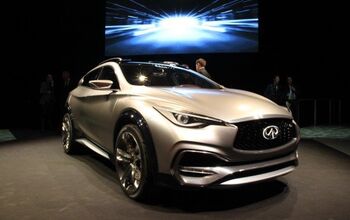Infiniti Will Bring a Split Personality to the Geneva Auto Show

Distinction is something Infiniti has aimed to achieve for a while now. It’s even attempting to do it under its own label by implementing cutting-edge technologies that can help to take the driver out of the equation or put him in the front of the pack, depending on what you’re into.
Nissan’s luxury division is heading to the Geneva Motor Show with two very different vehicles: the popular Q50 sedan, laden with the best driver assistance technology available, and a Q60 Project Black S performance coupe sporting a sport hybrid system borrowed from Formula One. The former is a sure thing, destined to be on sale for the 2018 model year, while the latter represents an entry in a hypothetical performance line as Infiniti investigates what level of insanity the general public is willing to accept.
The hybrid system snags leftover kinetic energy from regenerative braking and stores the electricity in a high-rate discharge lithium-ion battery. That juice then heads to an electric motor, adding a flourish of power by way of more low-end torque and a turbocharger that spools up more quickly. It’s essentially a Formula 1 KERS system for a production car. The majority of this technology stems from Nissan’s partnership with Renault SA’s F1 team — which Infiniti joined in 2016 to offer technical expertise. The automaker claims overall drivetrain power output will increase by 25 percent when the system is active.
While Mazda is developing a similar i-ELOOP recovery unit that offers added fuel economy, Project Black S will be the first performance-focused entry aimed at a broader market. However, as excited as Infiniti seems to be about the powertrain, it’s really just testing the waters. It even admitted that it is only building the concept Q60 to “gauge potential public interest in high-performance derivatives” of its cars. As of now, ERS development has been limited to prohibitively expensive track-focused cars. If the company does produce the Project Black S Q60, it will be the only vehicle of its kind.
The other car coming to Geneva is a mid-cycle update of the Q50 sedan — Infiniti’s global best seller. The model will adopt a new steer-by-wire system and be the first of the brand’s fleet to combine all of its semi-autonomous features with ProPilot Assist. That’s the same moniker Nissan uses for its gradually advancing autonomous tech. On the Q50, it includes intelligent cruise control with active lane keeping, blind spot alerts, lane departure warnings, backup collision prevention and and forward emergency braking. Infiniti also promises the updated steering will offer improved dynamic response and better feedback to the driver.
New Q50s have also been gently restyled, with modified headlamps, taillights, and an updated front end when equipped with the sport package. We’ll see more on that when it appears at the Geneva International Motor Show this month.
[Images: Infiniti]

A staunch consumer advocate tracking industry trends and regulation. Before joining TTAC, Matt spent a decade working for marketing and research firms based in NYC. Clients included several of the world’s largest automakers, global tire brands, and aftermarket part suppliers. Dissatisfied with the corporate world and resentful of having to wear suits everyday, he pivoted to writing about cars. Since then, that man has become an ardent supporter of the right-to-repair movement, been interviewed on the auto industry by national radio broadcasts, driven more rental cars than anyone ever should, participated in amateur rallying events, and received the requisite minimum training as sanctioned by the SCCA. Handy with a wrench, Matt grew up surrounded by Detroit auto workers and managed to get a pizza delivery job before he was legally eligible. He later found himself driving box trucks through Manhattan, guaranteeing future sympathy for actual truckers. He continues to conduct research pertaining to the automotive sector as an independent contractor and has since moved back to his native Michigan, closer to where the cars are born. A contrarian, Matt claims to prefer understeer — stating that front and all-wheel drive vehicles cater best to his driving style.
More by Matt Posky
Latest Car Reviews
Read moreLatest Product Reviews
Read moreRecent Comments
- Redapple2 Love the wheels
- Redapple2 Good luck to them. They used to make great cars. 510. 240Z, Sentra SE-R. Maxima. Frontier.
- Joe65688619 Under Ghosn they went through the same short-term bottom-line thinking that GM did in the 80s/90s, and they have not recovered say, to their heyday in the 50s and 60s in terms of market share and innovation. Poor design decisions (a CVT in their front-wheel drive "4-Door Sports Car", model overlap in a poorly performing segment (they never needed the Altima AND the Maxima...what they needed was one vehicle with different drivetrain, including hybrid, to compete with the Accord/Camry, and decontenting their vehicles: My 2012 QX56 (I know, not a Nissan, but the same holds for the Armada) had power rear windows in the cargo area that could vent, a glass hatch on the back door that could be opened separate from the whole liftgate (in such a tall vehicle, kinda essential if you have it in a garage and want to load the trunk without having to open the garage door to make room for the lift gate), a nice driver's side folding armrest, and a few other quality-of-life details absent from my 2018 QX80. In a competitive market this attention to detai is can be the differentiator that sell cars. Now they are caught in the middle of the market, competing more with Hyundai and Kia and selling discounted vehicles near the same price points, but losing money on them. They invested also invested a lot in niche platforms. The Leaf was one of the first full EVs, but never really evolved. They misjudged the market - luxury EVs are selling, small budget models not so much. Variable compression engines offering little in terms of real-world power or tech, let a lot of complexity that is leading to higher failure rates. Aside from the Z and GT-R (low volume models), not much forced induction (whether your a fan or not, look at what Honda did with the CR-V and Acura RDX - same chassis, slap a turbo on it, make it nicer inside, and now you can sell it as a semi-premium brand with higher markup). That said, I do believe they retain the technical and engineering capability to do far better. About time management realized they need to make smarter investments and understand their markets better.
- Kwik_Shift_Pro4X Off-road fluff on vehicles that should not be off road needs to die.
- Kwik_Shift_Pro4X Saw this posted on social media; “Just bought a 2023 Tundra with the 14" screen. Let my son borrow it for the afternoon, he connected his phone to listen to his iTunes.The next day my insurance company raised my rates and added my son to my policy. The email said that a private company showed that my son drove the vehicle. He already had his own vehicle that he was insuring.My insurance company demanded he give all his insurance info and some private info for proof. He declined for privacy reasons and my insurance cancelled my policy.These new vehicles with their tech are on condition that we give up our privacy to enter their world. It's not worth it people.”




































Comments
Join the conversation
"...the popular Q50 sedan, laden with the best driver assistance technology available..." It's a shame that the core drivetrains are as durable as ever, but all that built in "technology" raises the cost of purchase and repair beyond reason. Add all the wacky infotainment, also built in, and I now long for the halcyon days of "more cupholders!"
I like the ideas of F1 style KERS finally in a production car. Frightfully complex though. Who will fix this stuff in 10 years? Also, wish the flywheel type of KERS had been successful - flywheels, gazillion rpm, how cool is that?